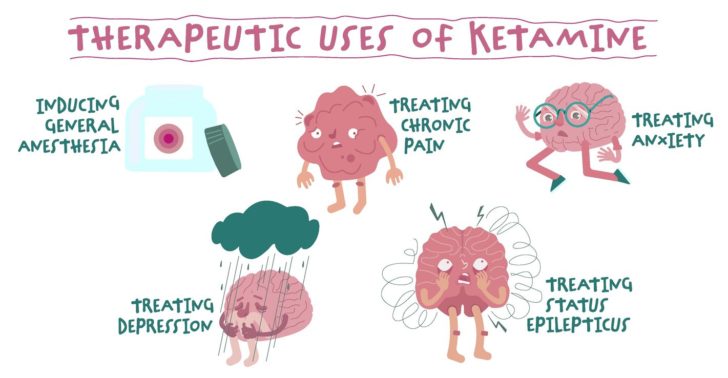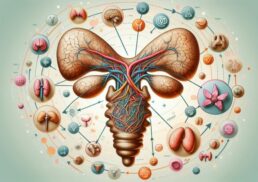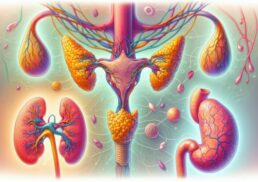Are you or a loved one struggling with treatment-resistant depression or other mental health conditions? You might be intrigued to know that ketamine therapy, once known primarily as a dissociative anesthetic, is now gaining ground as a revolutionary treatment with rapid antidepressant effects. In this comprehensive guide, we’ll explore the ins and outs of ketamine therapy, its benefits, potential side effects, and the future of this groundbreaking treatment option.
Table of Contents
Key Takeaways
Ketamine therapy is gaining popularity as an effective treatment for mental health conditions, such as depression and PTSD.
Esketamine offers increased potency with fewer side effects when combined with oral antidepressants.
Research is ongoing to investigate the long-term efficacy and safety of ketamine therapy, along with emerging treatments that offer more accessible options for those struggling with mental health conditions.
Understanding Ketamine Therapy

Ketamine therapy, involving the administration of low doses, is employed for treating various mental health conditions like treatment-resistant depression, anxiety disorders, and PTSD. Although not FDA-approved for these specific applications, ketamine exhibits potential by inducing deep and lasting changes in insight, mood, behavior, and consciousness, thus benefitting those grappling with major depressive disorder.
The renewed popularity of ketamine partially stems from its endorsement for treating treatment-resistant depression and the clinical trials that underscore its efficacy in mitigating depressive symptoms.
What is Ketamine?
Ketamine, initially developed as a dissociative anesthetic, has been repurposed for its rapid antidepressant properties on treatment-resistant depression. Its unique mechanism of action in the brain involves inhibiting NMDA receptors and stimulating glutamate production, which can result in the growth of new neural connections.
As a treatment for depression, ketamine has demonstrated significant and rapid reductions in symptoms, with effects often manifesting within hours of administration.
How Does Ketamine Work in the Brain?
Ketamine’s antidepressant effects stem from its ability to block NMDA receptors and increase glutamate production in the brain. As a result, ketamine facilitates the formation of new neural connections, allowing the brain to become more adaptable and capable of creating new pathways, providing patients with the opportunity to develop more beneficial thoughts and behaviors.
This distinctive mechanism of action sets ketamine apart from traditional antidepressants and contributes to its rapid and sustained effects on mood.
The Rise of Ketamine Infusion Therapy
Over the past two decades, ketamine infusion therapy has gained popularity due to its rapid antidepressant effects, providing relief within hours and lasting for days or longer. Early research on the efficacy of ketamine infusion therapy for treatment-resistant depression (TRD) and post-traumatic stress disorder (PTSD) revealed its potential to quickly alleviate symptoms and provide a viable alternative to traditional treatments.
The rapid antidepressant effect of ketamine infusion therapy has been reported to manifest within hours or days, in contrast to the weeks of chronic treatment required by traditional antidepressants.
Benefits and Rapid Antidepressant Effects
Ketamine therapy can lead to significant improvements in depression, anxiety, and illness severity, with effects lasting up to a month. Research has shown that a single dose of ketamine can rapidly reduce depressive symptoms, with effects persisting for up to a week.
Patients with treatment-resistant depression who were initiated on an oral antidepressant and intranasal esketamine showed improvement in one study. 70% of them experienced improvement, as compared to just over half in the placebo group. The rapid onset of antidepressant effects sets ketamine therapy apart from traditional treatments, providing hope for individuals struggling with severe depression.
Multiple Infusion Sessions
To achieve optimal results, multiple infusion sessions are typically required, with the number of sessions varying based on individual needs. Research indicates that multiple infusions are often necessary to reduce depression symptoms and sustain antidepressant effects. Generally, three to six treatments over several weeks are recommended for ketamine infusion sessions for depression treatment.
The frequency of ketamine infusion sessions can range from twice weekly to thrice weekly, and the number of sessions may be adjusted according to the patient’s needs and the clinician’s assessment.
Esketamine: A More Accessible Alternative
Esketamine, an FDA-approved drug, is a more accessible alternative to ketamine, offering similar benefits with a more potent and patient-friendly nasal spray delivery method. Chemically similar to ketamine, esketamine binds more tightly to NMDA glutamate receptors, making it more potent. This increased potency allows for lower doses to be taken, potentially leading to fewer side effects.
Yet, one should remember that to maximize its efficacy and reduce side effects, esketamine should be combined with oral antidepressants.
How Esketamine Differs from Ketamine
Esketamine is the S (+) enantiomer of ketamine, meaning it is chemically similar to ketamine but has a binding affinity for NMDA glutamate receptors that is 2 to 4 times greater than that of ketamine. This increased potency allows for lower doses to be taken, potentially leading to fewer side effects.
The rapid onset of antidepressant effects sets esketamine apart from traditional treatments, providing hope for individuals struggling with severe depression.
Combining Esketamine with Oral Antidepressants
Esketamine must be taken in combination with oral antidepressants to maximize its effectiveness and minimize side effects. Evidence suggests that combining esketamine with oral antidepressants may enhance treatment outcomes for those with treatment-resistant depression.
This combination therapy, which includes the use of antidepressant medications such as selective serotonin reuptake inhibitors, has been shown to provide rapid relief from depressive symptoms, making it an effective treatment option for individuals struggling with severe depression.
Safety and Side Effects of Ketamine Therapy

While ketamine therapy can provide significant benefits for individuals with treatment-resistant depression and other mental health conditions, it’s important to consider the potential short-term side effects and long-term risks associated with the treatment. Short-term side effects may include dissociation, sedation, and elevated blood pressure, while long-term risks can involve damage to the bladder, urinary tract, liver, and the development of addiction.
Proper medical supervision and monitoring are essential to minimize these risks and ensure patient safety.
Short-Term Side Effects
Short-term side effects of ketamine therapy may include:
Dissociative experiences
Dizziness
Nausea
Elevated blood pressure
Increased heart rate
These side effects generally peak within one hour of administration and subside within two hours. It’s important to note that these side effects can usually be managed or reduced with the help of a healthcare professional experienced in ketamine therapy.
Long-Term Risks and Medical Monitoring
Long-term risks of ketamine therapy include:
Potential damage to the bladder, urinary tract, liver
Development of addiction
Tolerance development, requiring increased doses to achieve the desired effect
Increased risk of addiction and dependency
Regular ketamine infusion therapy may also lead to these risks.
Ongoing, in-person monitoring by a medical professional is essential to reduce the risk of potential adverse effects, including bladder damage, urinary problems, liver-toxicity, and addiction related to substance abuse.
Who is a Candidate for Ketamine Therapy?
Ketamine therapy is primarily recommended for individuals with:
Treatment-resistant depression
Anxiety disorders
PTSD
Chronic pain
Eligibility for ketamine therapy should be assessed by a healthcare professional, taking into account individual risk factors and treatment history.
Research is ongoing to explore the potential of ketamine therapy for treating other mental health conditions beyond depression, including anxiety disorders and PTSD.
Assessing Eligibility
Eligibility for ketamine therapy is typically assessed by board-certified psychiatrists or primary healthcare providers who will evaluate the patient’s current and past health to determine if they are a suitable candidate for ketamine therapy. Factors to consider when assessing eligibility include the patient’s treatment history, medical conditions, and individual risk factors.
Potential risks associated with ketamine therapy should also be evaluated, as certain health conditions or risk factors may render some patients unsuitable for the treatment.
Other Mental Health Conditions Treated with Ketamine
In addition to treating depression, ketamine therapy has shown promise in treating a variety of mental health conditions, such as anxiety disorders and PTSD. Research has demonstrated that ketamine therapy can be effective in treating anxiety disorders, such as refractory anxiety and anxiety with treatment resistance, providing rapid relief from symptoms.
Studies have also demonstrated that ketamine may decrease the incidence of PTSD symptoms and substantially reduce the symptoms of chronic PTSD.
Learn more, visit Are You a Candidate for Ketamine Therapy?
Navigating the World of Ketamine Clinics
The rising popularity of ketamine therapy has resulted in an increase in the number of ketamine clinics, expanding patient access to this potential treatment. Nonetheless, ketamine clinics vary in quality. An essential step is to investigate and select a reputable clinic that prioritizes patient safety and adheres to established protocols.
In this section, we’ll explore what to look for in a ketamine clinic and discuss insurance coverage and cost considerations.
What to Look for in a Ketamine Clinic
When selecting a ketamine clinic, it’s important to look for experienced staff, proper medical supervision, and a focus on patient safety and well-being. Reputable ketamine clinics should have licensed and trained professionals, be in compliance with regulations, and possess certification or training in ketamine therapy.
Additionally, ensure that the clinic follows proper safety protocols, such as:
Taking baseline vital signs and mental status
Guaranteeing the patient has transportation home
Providing robust safety measures during therapy sessions.
Insurance Coverage and Cost Considerations
Given the variability of insurance coverage for ketamine therapy and potentially significant out-of-pocket expenses, financial considerations should be factored in when selecting a clinic. The cost of ketamine infusion therapy can range from $400 to $2000 per treatment, depending on the type of condition being treated and the duration of the infusion.
To help with the financial burden of ketamine therapy, financial assistance programs and financing options are available through organizations such as the Serenity Foundation, the Ketamine Therapy Scholarship, and companies like Advance Care and CareCredit.
Future Research and Developments in Ketamine Therapy
Current research endeavors are focused on the following:
Long-term efficacy and safety of ketamine therapy
Exploration of innovative treatment options
Refining treatment protocols
Broadening the potential applications of ketamine therapy for diverse mental health conditions
Enhancing patient outcomes
The goal of this research is to advance our understanding of ketamine therapy and improve its effectiveness in treating mental health conditions.
Investigating Long-Term Efficacy and Safety
Future research will focus on understanding the long-term benefits and potential risks of ketamine therapy, as well as optimizing treatment protocols. Recent studies have demonstrated significant improvements in depression, anxiety, and illness severity scores with repeated doses of ketamine, but more research is needed to fully understand the long-term effects of this treatment.
Additionally, ongoing research will explore the safety of long-term ketamine use in therapy, including its potential impacts on brain structure and function.
Emerging Treatments and Innovations
Emerging treatments and innovations in ketamine therapy may lead to more effective and accessible options for individuals suffering from treatment-resistant depression and other mental health conditions. Innovations in administering ketamine treatment include intravenous infusion, intramuscular injection, and intranasal administration, offering patients a wider range of treatment options.
As our understanding of ketamine therapy continues to grow, we can expect to see further advancements in biotechnology, enhancing the effectiveness of this groundbreaking treatment.
Summary
In conclusion, ketamine therapy has emerged as a promising treatment option for individuals struggling with treatment-resistant depression and other mental health conditions. Its rapid antidepressant effects, combined with emerging innovations and ongoing research, hold the potential for a brighter future for those suffering from mental health disorders. As we continue to learn more about the long-term efficacy and safety of ketamine therapy, it is our hope that this revolutionary treatment will become more accessible and effective for those who need it most.
Frequently Asked Questions
How quickly can I expect to see improvements in my depression symptoms after ketamine therapy?
You can expect to see improvements in your depression symptoms within hours of receiving ketamine therapy.
Are there any potential long-term risks associated with ketamine therapy?
Long-term use of ketamine has been linked to potential damage to the bladder, urinary tract, liver, and even addiction, making it a potentially risky therapy.
Can ketamine therapy be used to treat anxiety disorders or PTSD?
Yes, ketamine therapy has been found to be effective in treating anxiety disorders and PTSD alongside depression.
How much does ketamine infusion therapy typically cost?
Ketamine infusion therapy typically costs between $400 and $2000 per treatment.
What are the most common short-term side effects of ketamine therapy?
Ketamine therapy can cause short-term side effects such as dissociation, dizziness, nausea, elevated blood pressure, and increased heart rate.









